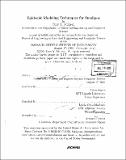Epidemic modeling techniques for smallpox
Author(s)
McLean, Cory Y. (Cory Yuen Fu)
DownloadFull printable version (5.425Mb)
Other Contributors
Massachusetts Institute of Technology. Dept. of Electrical Engineering and Computer Science.
Advisor
Adam Szpiro and Lucila Ohno-Machado.
Terms of use
Metadata
Show full item recordAbstract
Infectious disease models predict the impact of outbreaks. Discrepancies between model predictions stem from both the disease parameters used and the underlying mathematics of the models. Smallpox has been modeled extensively in recent years to determine successful response guidelines for a future outbreak. Five models, which range in fidelity, were created for this thesis in an attempt to reveal the differences inherent in the mathematical techniques used in the models. The disease parameters were standardized across all models. Predictions for various outbreak scenarios are given, and the strengths and weaknesses of each modeling technique are discussed. The mixing strategy used greatly affects the predictions of the models. The results gathered indicate that mass vaccination should be considered as a primary response technique in the event of a future smallpox outbreak.
Description
Thesis (M. Eng.)--Massachusetts Institute of Technology, Dept. of Electrical Engineering and Computer Science, 2004. Includes bibliographical references (p. 119-121).
Date issued
2004Department
Massachusetts Institute of Technology. Department of Electrical Engineering and Computer SciencePublisher
Massachusetts Institute of Technology
Keywords
Electrical Engineering and Computer Science.